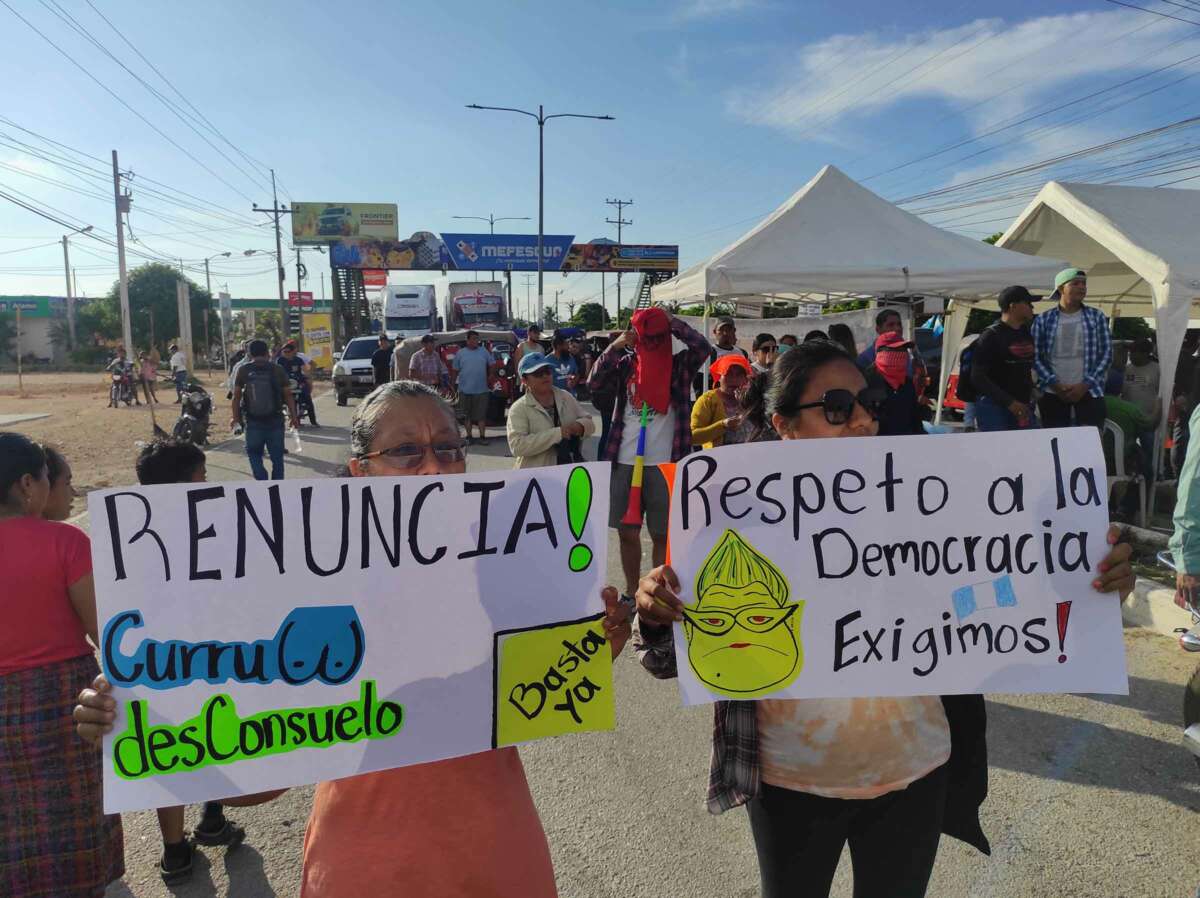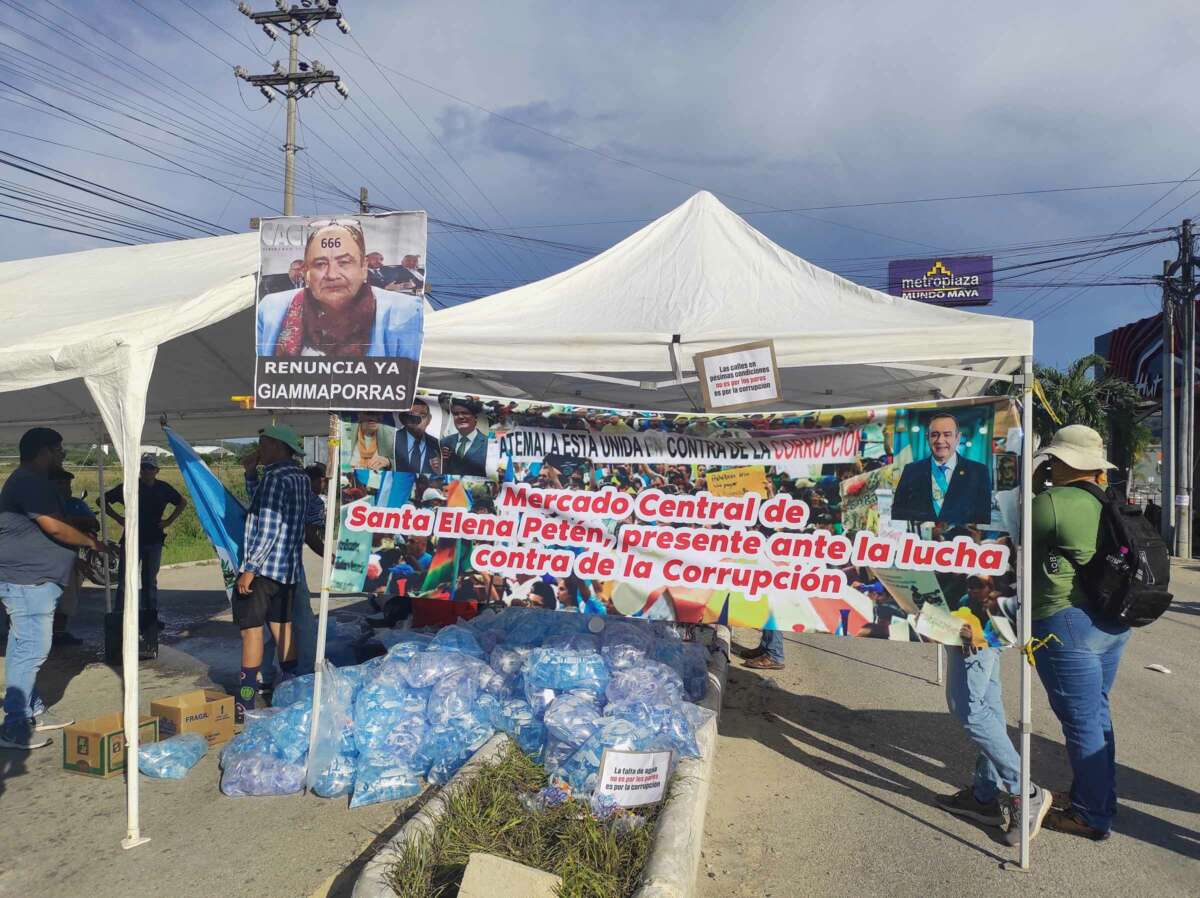Did you know that Truthout is a nonprofit and independently funded by readers like you? If you value what we do, please support our work with a donation.
Imelda Mejía and her daughter held their homemade protest signs high, standing in the middle of the highway despite the blistering heat in the lowlands of northern Guatemala. Others sought shelter in the shade, doled out water and bread, and took turns on a megaphone to keep spirits high at the action in Santa Elena, nearly 300 miles north of Guatemala City.
“We’re here because we need to defend our rights and our votes,” Mejía, a 52-year-old homemaker, told Truthout. “We can’t take all the corruption.”
Guatemalans are taking a stand for democracy with an indefinite national shutdown in the wake of officials’ ongoing actions undermining the election process that led to anti-corruption politician Bernardo Arévalo’s victory in the August 20 presidential election. More than a week into the shutdown, protesters are vowing to keep up the actions until the attorney general and three other judicial officials resign, despite statements by the president and other officials announcing imminent crackdowns and possible arrests of protest leaders.

“Blockades are not peaceful. Blockades restrict not only the freedom of movement but also impede other rights,” President Alejandro Giammattei said in a national broadcast on October 9. “I want to be emphatic: All these acts outside the bounds of the law will no longer be tolerated.”
The protest blockade at the main entrance to Santa Elena, in the northernmost Petén department, is just one of more than 120 actions on highways and roads around the country. Heeding calls from Indigenous Maya traditional authorities in the western highlands, thousands of people primarily in Indigenous regions began taking over highways on October 2, and the protests have been spreading ever since.
Maya K’iche, Xinka, Maya Kaqchikel, and other leaders from autonomous Indigenous governance structures converged in the capital on September 18 to present their demands to various government institutions with a warning that they were prepared to shut down highways within two weeks. “Our patience is reaching its limit,” Esteban Toc, one of the Indigenous traditional authorities from Sololá, told the crowd during a march from one government building to another.
Arévalo, a progressive congressman and sociologist, has faced backlash from judicial system officials since June, when he unexpectedly secured a spot in the presidential runoff, and it has only increased since he won in August. Indigenous authorities, social movements, analysts and Arévalo himself view the post-election backlash as a slow-motion technical coup d’état. Runner-up Sandra Torres of the UNE party never conceded.
“This mobilization is to support and join the Indigenous peoples’ movements that have been at it for days,” said Jonnathan Tobar, a 23-year-old agronomy student taking part in the Santa Elena blockade, which began on October 7. The primary aim of the blockades, as a pressure tactic, is to affect “the corrupt big businesspeople who have been the puppet masters of puppets in the government,” he said.

Prosecutors continue to pursue several cases related to political parties and both the June and August elections. One of the cases aims to suspend Arévalo’s party, Movimiento Semilla (“Seed Movement”), for alleged irregularities in signatures collected years ago for the party’s registration. Movimiento Semilla itself came forward in March to report a potentially falsified signature, but after Arévalo made the runoff, prosecutors announced an investigation into thousands of signatures. The suspension, ordered by a judge, is on hold until October 31, when the election-related process will legally end.
“They are looking for anything to use against the president-elect,” Toc told Truthout at a protest in Guatemala City. “There is so much corruption and they are trying to stop him from [taking office].”
Prosecutors have been criminalizing election officials, including electoral tribunal magistrates, seeking to lift the immunity from prosecution their posts provide. Prosecutors have also carried out several raids at the electoral tribunal headquarters. During the most recent raid, from September 30 to October 1, they seized original vote tally sheets. Nationwide shutdown actions began the following day.
The overarching demand of the shutdown protests is the resignation of four officials who have been publicly leading efforts to undermine the election process and results: Consuelo Porras, Guatemala’s attorney general; Rafael Curruchiche, special anti-impunity prosecutor; Cinthia Monterroso, another prosecutor; and Judge Fredy Orellana. Due to their prior actions to undermine corruption cases and criminalize journalists, they are all designated as corrupt and undemocratic actors under the United States-Northern Triangle Enhanced Engagement Act and are barred from entering the U.S.
“Protesting, taking the streets, and especially setting up blockades is the only way those in power can hear us.”
Up at the blockade in Santa Elena, people cheered as two young women arrived with a piñata of a person with images of the faces of Porras and Curruchiche affixed to its head. Students, market vendors, tourism operators, and other protesters formed a circle around people taking turns being blindfolded and trying to hit the piñata while it was jerked back and forth along a rope.

Resignations by the attorney general, prosecutors and judge would be an important first step, not a fix-all, Tobar told Truthout. “What comes after that is to ensure the transition of government is achieved because that is going to continue to be attacked,” he said. “We feel we have elected someone who could take us to the light at the end of the tunnel.”
The vast majority of national shutdown actions continue without incident, but not all. Civilians have driven vehicles through sparser blockade actions on at least three occasions, fired shots at two blockades and threatened others. Police fired tear gas at a Guatemala City rally on October 9, after a small group of mostly masked young men showed up and smashed some windows. Despite Giammattei’s October 9 evening warning that the executive branch “will not hesitate in taking all necessary measures,” crackdown efforts on October 10 were limited and ultimately unsuccessful. Riot police fired tear gas to evict a blockade 40 miles west of the capital, but protesters regrouped. Riot police and some military police were deployed to a few points in Guatemala City and showed up at a key urban blockade, attempting to negotiate its dissolution but more people arrived to strengthen the protest and security forces eventually withdrew.
“People are not afraid,” said Wilian Ortega, a member of CODECA, a land and small farmers’ rights movement. He and other CODECA members were participating in the Santa Elena blockade on October 10 dismissed the government’s warning about crackdowns. Security forces simply do not have the numbers or capacity to clear all the shutdown actions around the country, said Ortega.
“If they move us from here, we will just regroup elsewhere,” he told Truthout. “We are going to be here until the objective is achieved.”
Protesters believe the ultimate objective of the attorney general and other officials’ actions is to mount a case to attempt to prevent Arévalo from taking power on January 14. Many assert the president is publicly affirming the transition but privately colluding with the attorney general. Giammattei has repeatedly and emphatically stated the president-elect will take office as planned.
Still, questions remain and some investigations are under wraps. Prosecutors requested documentation from the electoral tribunal on election proceedings and actors, including the tens of thousands of volunteers who staffed the polling stations. The tribunal complied with the requests without access to any information about the motives of the investigations, according to tribunal magistrates.
Carmen Cuj was one of those volunteers. A 23-year-old teacher from San Lucas Tolimán, a predominantly Maya Kaqchikel town 70 miles west of the capital, she has helped staff a polling station during the last two election cycles.
“Every four years we exercise our right to elect and be elected. [Volunteering] is a way to be able to serve our country,” she told Truthout, condemning the attorney general and demanding the election outcome be respected.
“It is so much abuse,” said Cuj. “Protesting, taking the streets, and especially setting up blockades is the only way those in power can hear us.”
Press freedom is under attack
As Trump cracks down on political speech, independent media is increasingly necessary.
Truthout produces reporting you won’t see in the mainstream: journalism from the frontlines of global conflict, interviews with grassroots movement leaders, high-quality legal analysis and more.
Our work is possible thanks to reader support. Help Truthout catalyze change and social justice — make a tax-deductible monthly or one-time donation today.
